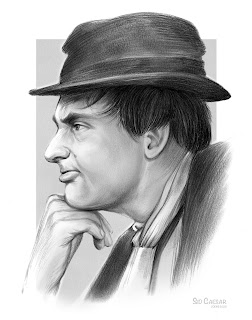 |
| Sid Caesar |
Isaac Sidney Caesar (September 8, 1922 – February 12, 2014) was an American comic actor and writer, best known for two pioneering 1950s live television series: Your Show of Shows, which was a 90-minute weekly show watched by 60 million people, and its successor, Caesar's Hour, both of which influenced later generations of comedians.[1] Your Show of Shows and its cast received seven Emmy nominations between the years 1953 and 1954 and tallied two wins. He also acted in movies; he played Coach Calhoun in Grease (1978) and its sequel Grease 2 (1982) and appeared in the films It's a Mad, Mad, Mad, Mad World (1963), Silent Movie (1976), History of the World, Part I (1981), Cannonball Run II (1984), and Vegas Vacation (1997).
Caesar was considered a "sketch comic" and actor, as opposed to a stand-up comedian. He also relied more on body language, accents, and facial contortions than simply dialogue. Unlike the slapstick comedy which was standard on TV, his style was considered "avant garde" in the 1950s. He conjured up ideas and scene and used writers to flesh out the concept and create the dialogue. Among the writers who wrote for Caesar early in their careers were Mel Brooks, Neil Simon, Larry Gelbart, Carl Reiner, Michael Stewart, Mel Tolkin, Selma Diamond, and Woody Allen. "Sid's was the show to which all comedy writers aspired. It was the place to be," said Steve Allen.
His TV shows' subjects included satires of real life events and people—and parodies of popular film genres, theater, television shows, and opera. But unlike other comedy shows at the time, the dialogue was considered sharper, funnier, and more adult-oriented. He was "...best known as one of the most intelligent and provocative innovators of television comedy," who some critics called television's Charlie Chaplin and The New York Times refers to as the "...comedian of comedians from TV's early days."[2]
Honored in numerous ways over 60 years, he was nominated for 11 Emmy Awards, winning twice. He was also a saxophonist and author of several books, including two autobiographies in which he described his career and later struggle to overcome years of alcoholism and addiction to barbiturates. Source: Wikipedia


No comments:
Post a Comment